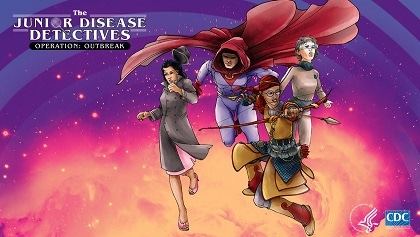What to know
CDC has partnered with programs across the country to help improve the health quality for Americans in rural areas. These are some of the successes the programs have seen.

CDC collaborates with partners to prevent swine flu in youth

The Influenza and Zoonoses Education among Youth in Agriculture (Youth in Ag) program is a successful collaboration between CDC, USDA, CSTE, Land-grant universities, and state and local governments that aims to reach millions of rural youths and their families who are at a higher risk of exposure to swine influenza and other zoonotic diseases. Michigan is one of four states that has received funding since 2014. Through this program, Michigan's Department of Health and Human Services (MDHHS) and Michigan State University (MSU) have created and distributed tens of thousands of educational materials to rural youth through 4-H including a "Zoonotic Disease Educational toolkit."
The materials engage youth directly with in-person courses such as the "Be a Disease Detective" Exploration Days. Additionally, MDHHS and MSU have hosted 46 events, such as regional meetings themed "Be Healthy at the Fair," to engage local agricultural stakeholders throughout Michigan. Successful human and animal health partnerships developed through the Youth in Ag program facilitated a rapid response to agricultural fair-associated cases of swine flu H3N2v in people in Michigan and Ohio in 2016.
Programs in schools

Educating children and teens to prevent flu variant infections
Variant flu infections, which are human infections with (flu) viruses that normally circulate in pigs (swine) but not people, can occur each year in the United States. Many variant flu infections occur in children and often are associated with exposure to infected pigs or their environments at large agricultural fairs. In order to educate children and teens about variant flu and the actions that they can take to protect themselves and prevent the spread of flu between pigs and people, CDC collaborated with USDA's Animal and Plant Health Inspection Service (APHIS) and 4-H National Headquarters within USDA's National Institute of Food and Agriculture (NIFA) to create a graphic novel called the Junior Disease Detectives: Operation Outbreak.
The graphic novel and its associated educational content is intended for children and teens who show or have contact with pigs, or who may visit agricultural fairs or animal pettings zoos, as well as for formal educational use in K-12 classrooms across the country. CDC hopes the graphic promotes youth interest in science as well as public and animal health, and that it inspires the next generation of real-life disease detectives. The graphic novel is available for free download and as an eBook from Apple iTunes.

Increasing child safety seat use
Child safety seat use increased by 34% on the Yurok Tribe Reservation, four years after starting Buckle Up Yurok (BUY), a motor vehicle injury prevention program developed by the California Rural Indian Health Board. In 2010, the Board received a CDC grant to launch BUY. The grant required the program to use motor vehicle injury prevention strategies from The Community Guide. Program coordinator Danielle Lippert says, "The [Task Force's] findings helped us choose interventions that we could be confident were effective."

Increasing physical education in schools
In Illinois, concerns of rising obesity rates led policymakers to write a plan for state standards that enhance physical education in schools based on evidence-based intervention strategies from The Community Guide. The plan requires regular fitness testing in every school, as well as curriculum development. More than 800 teachers from 300 school districts have been trained to implement the related standards.

Program improves asthma-related symptoms in children
In implementing its home visitation program, the Montana Department of Public Health and Human Services used a Task Force recommendation from The Community Guide for home-based, multi-trigger, multi-component environmental interventions that support children and adolescents with asthma. CDC awarded the agency funding for a quality improvement plan, which referenced the Task Force recommendation. Within one month of implementation, the proportion of children in the program who experienced asthma-related symptoms dropped from 23% to 7%.
State programs

Increasing cancer screening for women in South Carolina
In rural South Carolina the risk of cancer-related death is a complex public health problem. The St. James-Santee Family Health Center launched the Black Corals program to increase cancer screening among women. The Community Guide served as a resource to help the program dramatically increase breast and cervical cancer screenings in their community.

Training community health workers to manage arthritis
In the mostly rural state of Kentucky, more than one million adults, or over 30% of the state's adult population, have arthritis. The Kentucky Department of Health's Arthritis Program, funded by CDC, is partnering with the Homeplace Program at the University of Kentucky Center of Excellence in Rural Health to train community health workers to offer Chronic Disease Self-Management Program workshops in rural communities.
In the heart of the United States, the Kansas Department of Health and Environment's Arthritis Program offers Chronic Disease Self-Management Program workshops in five rural counties in the northeast corner of the state. These counties have some of the highest rates of arthritis in the state, affecting up to 1 in 3 people in the hardest hit areas. With limited resources and long distances to travel, some health clinics provide transportation for their patients to attend the workshop each week, making it easier to receive services.

Utah Department of Health's arthritis program offers arthritis education
To the west in Utah, approximately 408,000 adults or 20% of the state's adult population have arthritis. Of those adults with arthritis, 45% are limited in their everyday activities because of the disease. Those in rural and frontier settings often have significantly less access to healthcare services. The Utah Department of Health's Arthritis Program, funded by CDC, currently works with community organizations—HealthInsight, Intermountain Healthcare, and the Central Utah Department of Health—to offer a Chronic Disease Self-Management Program known as "Living Well," which maintains a web portal where residents can easily register for and learn more about the workshops.
